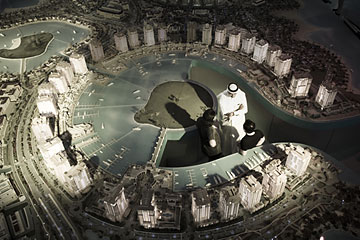
Arealestate sales office for Pearl-Qatar, a man-made-island project
When a cease-fire was called on Nov. 21 between Israel and Hamas, which governs the Gaza Strip, residents of Gaza rushed to the streets in relief. They set off firecrackers and waved the flags of everyone they wanted to thank for helping end eight days of bloody conflict. Hamas' flag fluttered along with those of Egypt and Turkey, countries that have long stood by Gazans' side. But a new banner joined the ranks: the maroon and white flag of Qatar.
Just a month before, Qatar's Emir Sheik Hamad bin Khalifa al-Thani visited Gaza to deliver a $400 million development package, becoming the first head of state to break, in the most public way possible, an Israeli blockade that had been in place since Hamas, an Islamist group, took control of Gaza in 2007. With that bold move in support of the world's most incendiary issue, Qatar placed itself squarely out front in a region that desires decisive leadership. The investment in Gaza earned the tiny emirate, better known for its outsize wealth than its strategic prowess, a place at a negotiating table that had long been reserved for bigger players.
As the balance of power shifts in the wake of the Arab Spring, Qatar, a nation of fewer than 2 million people, of whom only an estimated 250,000 are citizens, has muscled its way into a position of disproportionate importance. Punching above its geopolitical weight, this salt-scrubbed spit of land on the Persian Gulf has used political finesse and the judicious deployment of its vast oil and gas riches to engage early and consistently with the most difficult issues in its neighborhood. It was the first Arab nation to embrace Libya's anti-Gaddafi rebels; it then quickly threw its support to Syrians seeking the overthrow of former friend President Bashar Assad. The Emir's visit to Gaza was succeeded by an almost comic scramble among other regional nations to keep up with the Thanis. Egypt sent its Prime Minister nearly a month after the Emir's visit, and Turkey's Prime Minister has pledged to go.
Qatar is a paradox: an absolute dictatorship blessed with unimaginable wealth that has positioned itself as the champion of democratic change everywhere but at home. It is a conservative Sunni monarchy that has been ruled by one family since the mid--19th century, and yet it is spending billions of dollars buying assets and cultivating projects that might telegraph a savvy, sophisticated and forward-thinking image to the West. Qatar's leaders--a small, taciturn circle--have provided no explicit explanation for these moves, but analysts and Middle East experts say they all point in one direction. "Qatar wants to be the region's next superpower," says Fawaz Gerges, director of the Middle East Centre at the London School of Economics. "The Emir of Qatar knows well that there is a hunger for leadership, and he thinks Qatar should be that leader."
The World's Richest Nomads
